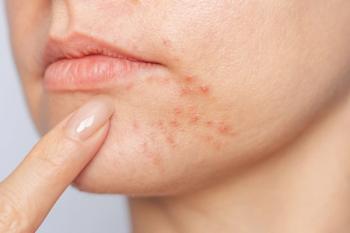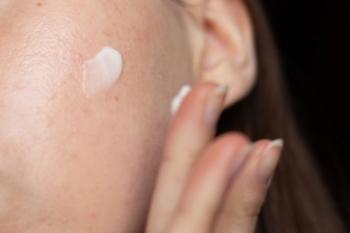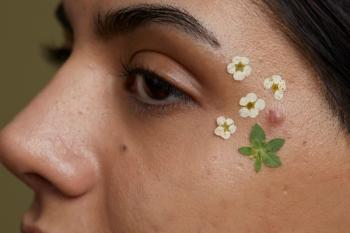
- Dermatology Times, August 2022 (Vol. 43. No. 8)
- Volume 43
- Issue 8
Acne May Impair Sleep Quality for Adult Patients
Studies suggest that the presence of acne makes sleep issues more likely, but results on the impact of acne severity on sleep vary across research.
Almost one-third of adults in the United States get less than the recommended amount of sleep.1 While that carries risks for several health conditions, the body of literature on the impact of sleep on acne risk or the effect of acne on sleep quality in adults is more limited.2
Three studies over the last three years have looked at the relationship of acne and sleep.1-3 Each of the study populations was predominately female, while the average age varied. Chaudhary et al included adolescents in their research,3 while Schrom et al and Halioua et al did not.1,2
Schrom et al. and Halioua et al. found a relationship between acne and sleep issues. “We have demonstrated that adult acne is associated with sleep issues. Patients did not report different levels of sleep issues depending on severity levels but, when asked specifically about the effect of their skin on sleep, more than 30% of severe patients reported being woken or prevented from sleeping because of their skin disease, thereby demonstrating a difference between severity levels. Our results confirm a recently published study,4 which reported significantly more (p<0.001) individuals with acne (54.6%) than without (47.6%) who reported lacking sleep and significantly more (p<0.001) individuals without acne (52.4%) than those with acne (50.3%) who reported restful sleep,” wrote Halioua et al.2 Neither they nor Chaudhary et al. found a significant relationship between sleep quality and acne severity.
Schrom et al. uncovered a relationship between acne severity and sleep. “Although fatigue may be a symptom of depression and patients whose quality of life has been more severely impacted by acne are more stressed, our research demonstrates that, when controlling for depressive symptoms and quality of life impact, subjectively worse sleep quality is associated with objectively worse acne.5,6 This suggests that there may be an influence of acne severity on subjective sleep quality and vice versa, confirming prior findings of the impact acne has on quality of life and mental health,”5,6-8 the authors wrote.2
All three studies relied on self-reported sleep habits.
References:
- Schrom KP, Ahsanuddin S, Baechtold M, Tripathi R, Ramser A, Baron E. Acne Severity and Sleep Quality in Adults. Clocks Sleep. 2019;1(4):510-516. Published 2019 Dec 6. doi:10.3390/clockssleep1040039
- B Halioua1 J,Shourick, J Taieb et al. Sleep Disorders in Adult Acne. Poster presented at: Presented at: 2022 American Academy of Dermatology Annual Meeting, March 25-29, Boston, Massachusetts.
- Chaudhary S, Ameer A, Sarwar MZ, Naqi SA, Butt AI. A cross-sectional study of body mass index and sleep quality as risk factors to severity of acne. J Pak Med Assoc. 2021;71(9):2148-2150. doi:10.47391/JPMA.404
- 4. Dreno B, Shourick J, Kerob D, Bouloc A, Taïeb C. The role of exposome in acne: results from an international patient survey. J Eur Acad Dermatol Venereol. 2020 May;34(5):1057-1064. doi: 10.1111/jdv.16119. Epub 2020 Feb 13. PMID: 31785166.
- Misery, L.; Wolkenstein, P.; Amici, J.M.; Maghia, R.; Brenaut, E.; Cazeau, C.; Voisard, J.J.; Taïeb, C. Consequences of acne on stress, fatigue, sleep disorders and sexual activity: A population-based study. Acta Derm. Venereol. 2015, 95, 485–488.
- Zauli, S.; Caracciolo, S.; Borghi, A.; Ricci, M.; Giari, S.; Virgili, A.; Bettoli, V. Which factors influence quality of life in acne patients? J. Eur. Acad. Dermatol. Venereol. 2014, 28, 46–50.
- Cappuccio, F.P.; Lanfranco, D.; Strazzulo, P.; Miller, M.A. Sleep duration and all-cause mortality: A systematic review and meta-analysis of prospective studies. Sleep 2010, 33, 585–592.
- Halvorsen, J.A.; Stern, R.S.; Dalgard, F.; Thoresen, M.; Bjertness, E.; Lien, L. Suicidal ideation, mental health problems, and social impairment are increased in adolescents with acne: A population-based study. J. Investig. Dermatol. 2011, 131, 363–370
Articles in this issue
over 3 years ago
Diagnostic Approaches for Melasma and Vitiligoover 3 years ago
When to Progress to Systemic Therapyover 3 years ago
Focusing on Feetover 3 years ago
He Is my Covering Physician. Why Am I Being Sued?over 3 years ago
Mouse Model May Shed Light on APC mutations in brain metastasesover 3 years ago
FDA Approves Roflumilast Cream 0.3% for Plaque PsoriasisNewsletter
Like what you’re reading? Subscribe to Dermatology Times for weekly updates on therapies, innovations, and real-world practice tips.











